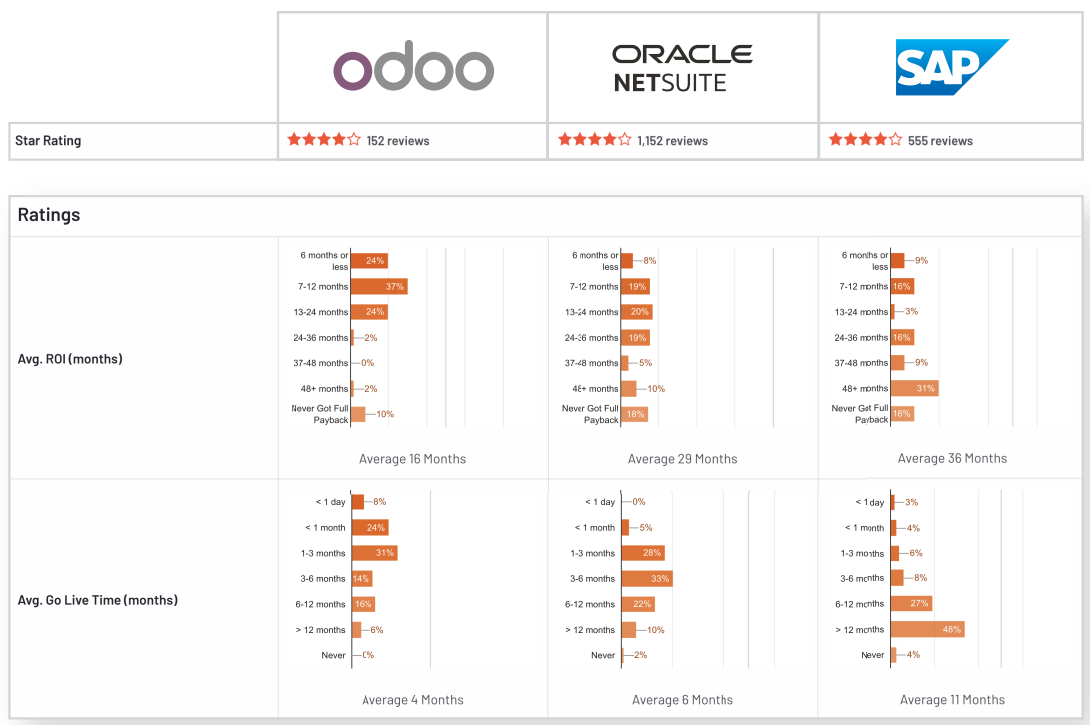In the competitive world of modern business, having the right tools is key to ensuring success and sustainability. Among these tools, enterprise resource planning (ERP) systems play a critical role. An ERP is not just software; it is the central hub that integrates and manages all of a company’s vital processes, from supply chain and production to finance and customer service. By centralizing this information, ERPs enable organizations to operate more effectively and efficiently, resulting in a noticeable increase in profits and productivity.
However, choosing the right ERP is no easy task. With a wide range of systems available, each with its own strengths and weaknesses, the decision can be overwhelming. In this blog, we will focus on Odoo, an open source enterprise resource planning (ERP) system that has stood out in the market for its adaptability and ease of use. We will compare Odoo to other popular ERPs such as SAP, Netsuite, Oracle and others, evaluating critical aspects such as implementation time, return on investment and the customization they offer.
In addition, we will discuss how the ERP market has evolved in recent years and where it is headed in the future. Are these systems simply here to stay or are they evolving to meet new challenges on the technological and economic horizon? Dive with us into this in-depth analysis to discover which ERP system might be the best fit for your organization and how it can transform the way you do business.
What is Odoo?
Odoo is not just an ERP; it is an integrated suite of business applications that revolutionizes the way companies manage their daily operations. Since its launch in 2005, Odoo has grown exponentially, attracting more than 7 million users worldwide thanks to its accessibility and powerful functionalities. This open source business management system stands out in the market for its versatility and ability to adapt to companies of any size, from small startups to large corporations.
The Odoo platform is exceptionally broad, covering modules that integrate all critical areas of a company. It includes, among others:
- Accounting: Complete financial management with tools that simplify analytical accounting, invoicing and all types of financial transactions.
- CRM (Customer Relationship Management): Improves customer interaction and helps manage leads, opportunities and after-sales services more efficiently.
- Project Management: Tools to plan, monitor and analyze projects, ensuring that deadlines and budgets are met.
- Inventory Management: Advanced systems for stock tracking, warehouse optimization and logistics.
In addition to these modules, Odoo is constantly enriched with new modules thanks to its developer community, allowing companies to further customize the system to meet their specific needs. This is possible because Odoo is open source, meaning that any developer can contribute to the code, improve features and create new applications that integrate seamlessly into the Odoo ecosystem.
Ease of use is also one of the great advantages of Odoo. Its interface is intuitive and easy to navigate, allowing users to manage their daily activities efficiently and without unnecessary complications. This translates into a shorter learning curve for employees and faster implementation compared to other more complex ERPs on the market.
What makes Odoo stand out from other ERPs?
Odoo is not only differentiated by its technical capabilities, but also by the direct impact it has on the operational and financial efficiency of the companies that adopt it. Based on the "Odoo ERP Comparison Report", Odoo outperforms key competitors such as Netsuite and SAP in several key aspects:

For example, the average time to see a return on investment (ROI) with Odoo is substantially lower, with companies reporting paybacks 13 and 20 months faster than with Netsuite and SAP respectively. Additionally, Odoo is faster to implement, with a median go-live time of 2 to 7 months shorter compared to these competitors, meaning companies can operate at full capacity with less disruption.
Additionally, according to a report by G2 Crowd, Odoo excels in the ‘Momentum’ and ‘Satisfaction’ indices, ranking ahead of almost all of its competitors. This reflects not only overall satisfaction with the product, but also the dynamism and continuous innovation that Odoo brings to the ERP market. Specifically, Odoo’s forecasting and inventory tracking features are highly rated, with a score of 93% compared to the market average of 84%. This indicates a superiority in Odoo’s ability to manage resources efficiently, which is crucial for any business looking to optimize its operations.
With all of this data on the table, we can now get an idea of how Odoo is positioning itself against its competitors, and doing so at breakneck speed.
Beyond the metrics, Odoo has significant advantages in terms of flexibility and scalability. Being an open source system, it allows organizations to customize and extend its functionality to meet specific needs without being tied to the limitations of proprietary systems. Odoo’s user interface is notoriously intuitive, designed to ease adoption and reduce the learning curve, which is essential to maximize productivity from the start.
In other ERPs and similar, such as SAP, Oracle, Navision or SAGE, there are problems between users due to the high complexity they may have and/or due to a lack of flexibility and ability to adjust to the demands of the company.
These are usually functional services, but they can generate adaptability problems for companies that want to begin their digitalization process, so they may not be the best ERP for SMEs. This is why Odoo has been gaining ground and popularity over the last few years in a constantly growing market.
Are ERPs the management tools of the future?
The ERP market and popularity has evolved greatly in recent years. These systems are becoming more standardized as businesses look for ways to streamline their operations and improve efficiency. According to a recent Gartner study, the global ERP market is expected to grow from $33.7 billion in 2020 to $45.6 billion in 2024, at a compound annual growth rate (CAGR) of 6.4%.
There are many reasons for this growing popularity, but one of the most important is that ERP systems can provide real-time insight into an organization's data. This enables businesses to make better decisions, faster. ERP systems, too, can automate many manual processes, freeing up employees to focus on more strategic tasks.

Furthermore, ERPs have taken a new direction in recent years. In the past, most systems were proprietary, meaning they were developed and maintained by a single company. However, today there are many open source options available, such as Odoo. Open source systems are run by a community of developers, and anyone can contribute to the development of the software. This makes open source ERP systems more flexible and easier to customize.
What is the future of Odoo and the ERP market?
Odoo has been on the market for over 10 years and is used by organizations of all sizes, from SMEs to large companies. In addition, it is presented as one of the management systems with the greatest growth in the market, with an annual increase reported during the last two years of more than 50% and with a long-term projection that poses it as one of the future leaders of the general market.
Odoo stands out for its ROI efficiency and speed of implementation. Compared to Netsuite and SAP, Odoo is on average 13 and 20 months ahead in ROI, and on average 2 and 7 months ahead in go-live time.
Additionally, Odoo offers high user satisfaction and is ranked as a leader in G2 Crowd reports, thanks to its flexibility and ease of use. Its open source nature allows for detailed customization to meet the specific needs of each organization, making it ideal for businesses of all sizes.
The ERP market has seen significant growth, projected to increase by 6.4% annually through 2024. This evolution is driven by businesses’ need to improve efficiency and decision-making. Odoo has played a crucial role in this transformation, leading the trend toward open source ERP systems.
These systems are more flexible and customizable, making them attractive to a wide range of businesses. Odoo, with its focus on innovation and adaptability, has established itself as a key player in the ERP market.
With over a decade on the market and over 50% annual growth, Odoo is projected to be one of the future leaders in the ERP market. Its success is based on the growing demand for core and open source ERP systems, where innovation and competition are on the rise.
Odoo’s flexibility and customizability make it ideal for adapting to the changing needs of businesses, suggesting a bright future for Odoo and open source ERP systems. As more businesses look for customizable and efficient ERP solutions, Odoo is well positioned to lead this growing market.
Do you dare to boost your business with us?
Contact us and get your personalized DEMO